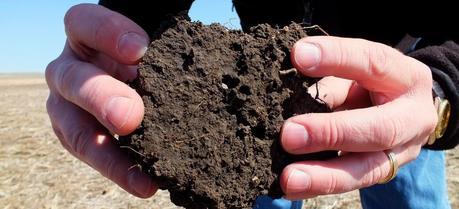 Healthy soil looks dark, crumbly, and porous, and is home to worms and other organisms. (Credit: USDA Natural Resources Conservation Service / Colette Kessler)
Healthy soil looks dark, crumbly, and porous, and is home to worms and other organisms. (Credit: USDA Natural Resources Conservation Service / Colette Kessler)Scientists at the Biotechnology and Biological Sciences Research Council (BBSRC) strategically-funded institute Rothamsted Research have shown that a biodiesel waste product could be used to protect soil quality for agriculture.
An important goal in agricultural sustainability is to establish better management of nitrogen (N) to prevent “leaching” of nitrate (NO3) out of the soil into water.
Rothamsted Research scientists have demonstrated that a by-product of the biodiesel industry shows potential to reduce nitrate leaching and so improve agricultural sustainability. The study is published in the journal Water Air and Soil Pollution (see footnote).
The demand for biofuel crops in the last decade has dramatically increased the pressures on agricultural land.
A criticism of biofuel production from oil crops is the inefficiency inherent in growing them. Much of this inefficiency is related to the production and losses of N fertilizer—a problem affecting all, not just biofuel crops. A potential way of mitigating against this inefficiency could be the use of the by-product and/or waste from biodiesel production, which has been shown to reduce nitrate leaching.
Dr Marc Redmile-Gordon, Rothamsted researcher that undertook the study said: “We are very excited by the findings of our work. We did three experiments, incorporating straw, meadow grass and Biodiesel Co-Product into experimental soils and simulated field conditions. We found that BCP was the most effective soil amendment, rapidly increasing the abundance of soil micro-organisms and preventing more than 99% of nitrate leaching. Cutting N-losses from agricultural land would be great step towards protecting the environment”.
Professor Keith Goulding, head of the Department of Sustainable Soils and Grassland Systems at Rothamsted said: “These findings are an exciting step towards making agriculture more efficient and so more sustainable. We will be following up this research to further understand the biological processes that underlie the observed results.”

